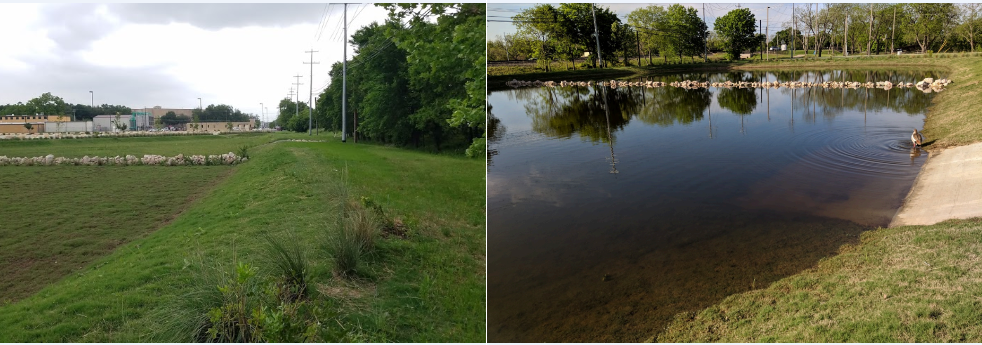
The City Park biofilteration pond is a regional water quality facility that treats stormwater runoff from a 20-acre watershed with approximately 12 acres of impervious cover. Pollutants are removed from captured stormwater as it slowly filters through the engineered soil. Photo courtesy of the City of San Marcos
San Marcos ranks fourth in annual stormwater scorecard
The City of San Marcos placed fourth in the Annual Environment Texas Stormwater Scorecard for 2020.
The city was among eight other cities and one county in Texas evaluated by Environment Texas, which examined the stormwater management policies of local governments throughout the state to see how they use nature-based infrastructure, how they prevent water pollution, mitigate flooding, alleviate, drought and reduce urban heat.
“This is a significant acknowledgement from a nonprofit monitoring group of the city’s conscious strides to protect water quality,” city Habitat Conservation Plan Manager Melani Howard said in a statement. “Our ambitious goal is to one day lead the state in these efforts by implementing the most effective and innovative solutions for stormwater management.”
San Antonio and Austin tied for the highest score at 69%. Harris County received a 66% rating, placing it in third. San Marcos earned a score of 58%.
“The city incorporates education into its maintenance program,” Environment Texas said of the City of San Marcos’ stormwater management policies. “If any feature fails its annual inspection, city staff work with the owner to develop a plan to address the problem with best-management practices and the facility is reinspected.”
Additionally, Environment Texas said the City of San Marcos should work on updating the way it monitors nature-based projects.
“Connecting water quality data taken from the San Marcos River to nature-based projects nearby, for example, could provide invaluable data on how well these features work,” Environment Texas said.
Local policies were divided into nine fundamental categories of three types: Private Development Regulations, which included stormwater detention requirements, water quality requirements and maintenance requirements; Private Development Incentives, which looked at regulatory incentives and financial incentives; and Public Initiatives, including construction of public projects, education monitoring and evaluation and regional collaboration.
According to the city, San Marcos scored particularly high in areas of private development maintenance requirements, stormwater detention requirements and regional collaboration.











